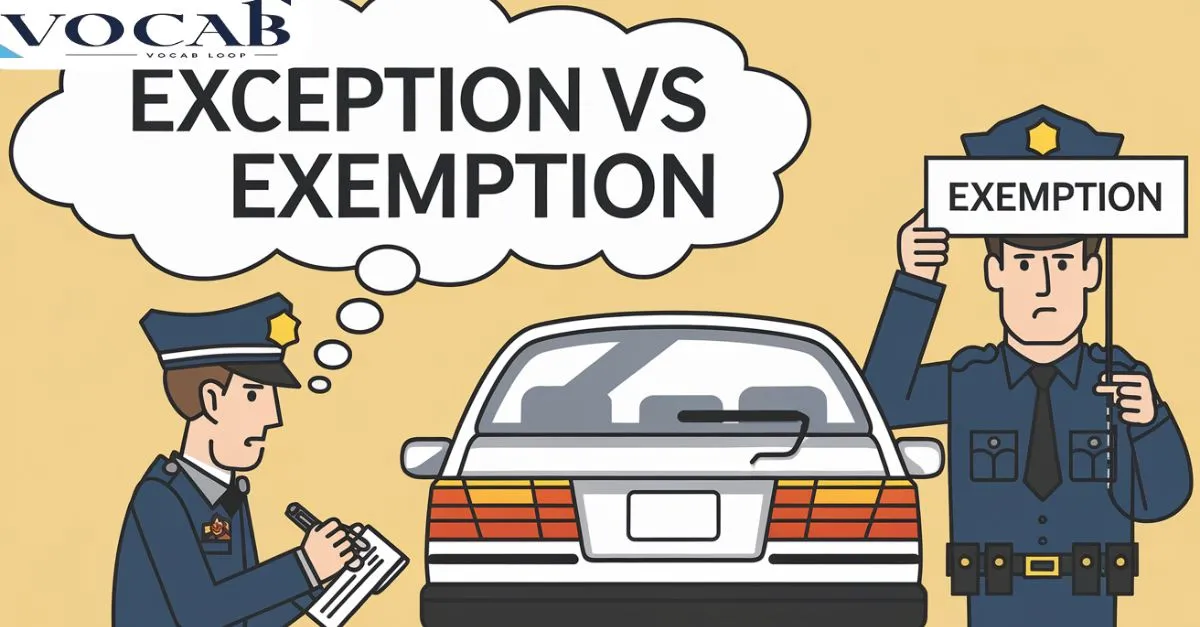When it comes to English spelling, exceptions and exemptions often create confusion. These words not only challenge spelling but also have slightly overlapping meanings, adding to the difficulty. Both function as nouns, but their uses differ significantly based on context.
Exception refers to something excluded from a rule, as in “This rule has no exceptions,” while exemption denotes relief from an obligation, such as “tax exemption.” Understanding their distinctions involves exploring their origins and correct usage in specific scenarios.
What Is There Confusion Exception vs Exemption?
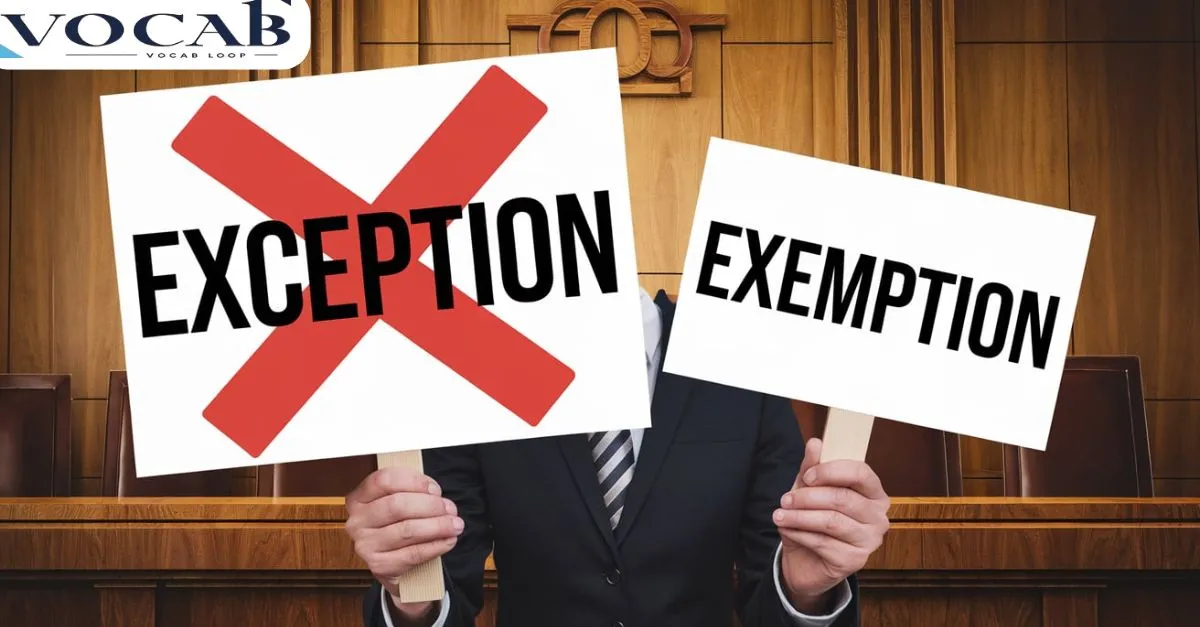
The confusion between exception and exemption stems from their similar sounds and spellings. People often mix them up because both relate to exclusions or special conditions. However, they’re used in different contexts. Exception refers to something that doesn’t follow a rule, while exemption is a freedom from a responsibility, like taxes.
Understanding these distinctions is key to avoiding mistakes.For example, when talking about sales tax exemptions, you’re referring to cases where items or transactions aren’t taxed. Meanwhile, allowable exceptions might apply to situations where a rule doesn’t hold, like an exception in a policy. These subtle differences can make a big impact.
Is the Exception Word Correct?
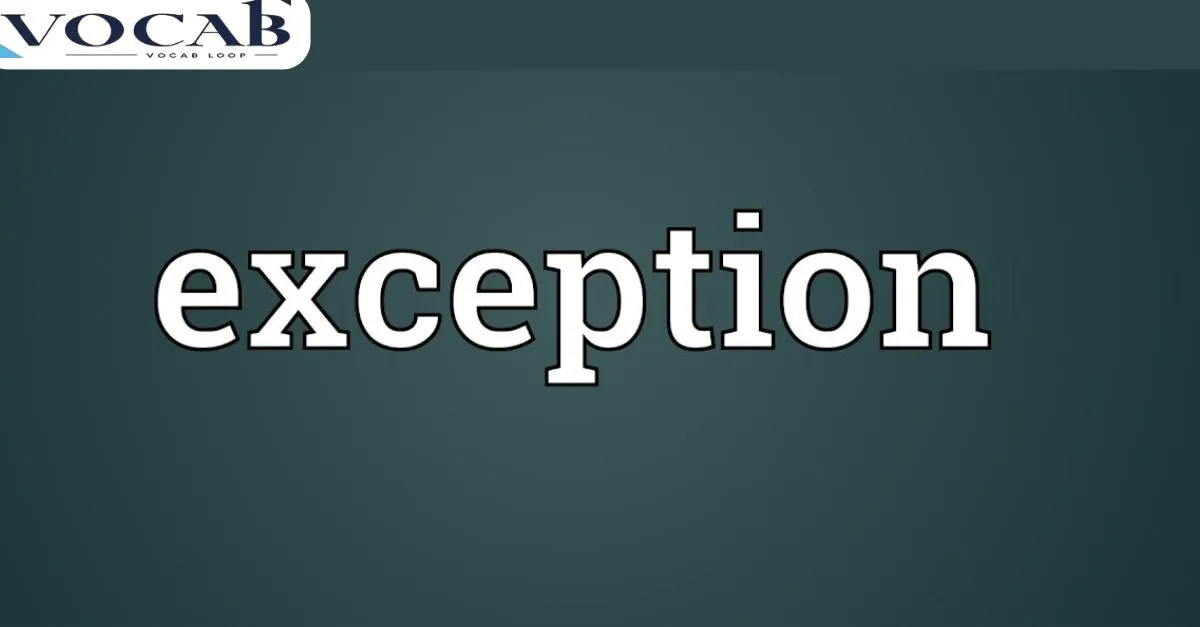
Yes, the word exception is correct and commonly used in English. It refers to something or someone that is excluded from a general rule or does not follow the norm. For example, “This rule has no exceptions” means there are no deviations allowed.
Exception is often used in conditional or explanatory contexts to highlight irregularities or unique cases. Its clear and specific meaning makes it essential for emphasizing when something does not conform to standard expectations.
Definition
The word exception means something that doesn’t follow a general rule. It is often used to highlight deviations or exclusions within rules, laws, or situations.
Meaning
To put it simply, exception refers to an irregularity or something that doesn’t apply universally. For example, “All employees must attend, with the exception of those on leave.” This means one or more individuals don’t need to comply with the rule.
Usage
You might encounter exception in legal texts, policies, or even in daily speech. It’s commonly used in contexts like “There are no exceptions to this rule” or “The only exception was during the holiday season.” Understanding its meaning is critical for proper usage.
Is the Exemption Word Correct?
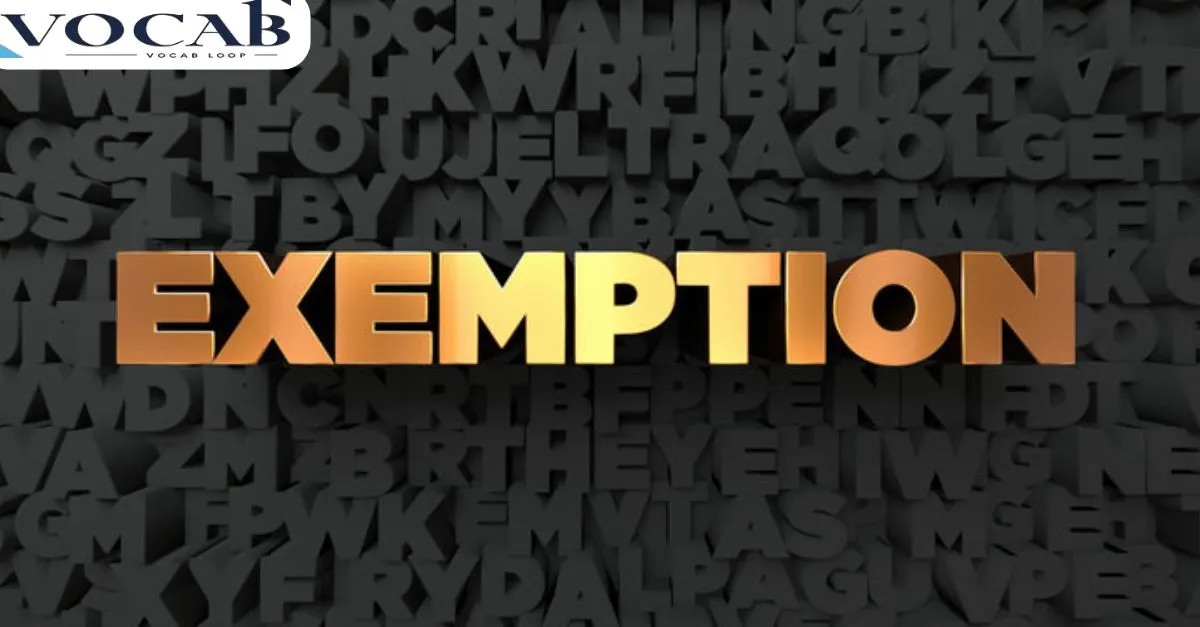
Yes, the word exemption is correct and widely used in English, particularly in legal, financial, and formal contexts. It refers to being excused from a rule, obligation, or requirement. For example, phrases like “tax exemption” or “medical exemption” demonstrate its application.
Unlike “exception,” which highlights irregularities or deviations, exemption emphasizes relief granted by authority. Its usage is precise and context-specific, making it an essential term for formal documents, contracts, or discussions involving permissions and exclusions.
Definition
The word exemption refers to a privilege or right that excludes someone from a duty, obligation, or tax. It’s about being excused from something mandatory.
Meaning
For instance, tax exemptions are granted to people or entities, freeing them from certain taxes. These could be property tax exemptions for veterans or exempt purchases for charities. Exemption typically has a legal or financial focus, unlike exception.
Usage
When filling out tax forms, you might claim an exemption certificate to avoid paying taxes on certain goods. Similarly, terms like non-taxable items and exclusion from taxable base often come into play with exemptions.
Quick Summary
| Aspect | Exception | Exemption |
| Definition | Something that doesn’t follow a rule | Freedom from an obligation |
| Context | Policies, rules, and general cases | Taxes, legal, or financial situations |
| Examples | Exception to a dress code rule | Exemption from property tax |
Exception vs Exemption as Parts of Speech
Both exception and exemption are nouns, but they serve different grammatical contexts. Exception frequently appears in conditional or explanatory sentences, often emphasizing deviations from a rule, as in “This rule has no exceptions.”
In contrast, exemption is typically used in legal or financial contexts, indicating relief or freedom from an obligation. For instance, “The exemption applies to this category” showcases its usage in formal documentation, particularly related to taxes or regulations.
Pronunciation of Exception vs Exemption
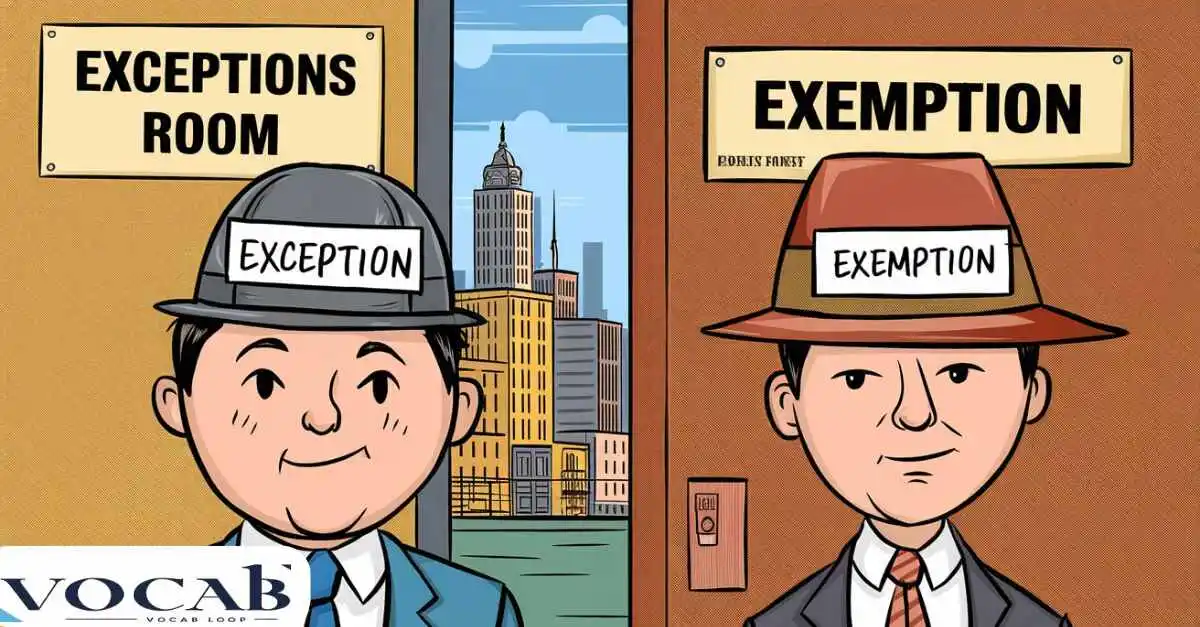
The pronunciation of exception is /ɪkˈsɛp.ʃən/, while exemption is pronounced as /ɪɡˈzɛmp.ʃən/. The primary difference lies in the middle syllable: “cep” in exception versus “zemp” in exemption.
This subtle distinction is crucial, as mispronouncing them may lead to confusion, particularly in formal or professional settings. Practicing both words aloud can help build clarity and confidence, ensuring accurate communication in discussions about policies, taxes, or regulations.
Side-by-Side Comparison Exception vs Exemption
| Criteria | Exception | Exemption |
| Function | Highlights irregularity | Grants freedom |
| Example Sentence | “Everyone came, with one exception.” | “This item qualifies for an exemption.” |
| Domain | General usage | Financial/legal usage |
Which One Is More Acceptable Exception vs Exemption?
Both words are correct, but their acceptability depends on context. In a business meeting, discussing tax compliance and reporting, exemption fits better.
If you’re talking about policy loopholes, exception is the right word. Understanding the audience and scenario ensures you choose the correct term.
Exception in British English and American English
In both American and British English, the word exception retains the same meaning. However, its usage varies slightly in phrasing. Americans commonly say “exception to the rule,” emphasizing conversational tone.
British speakers often lean toward more formal expressions, such as “exceptions are noted,” especially in official or written contexts. Despite these subtle differences, the fundamental concept of an exception remains unchanged across both forms of English.
Exemption in British English and American English
The term exemption remains consistent across English variations. However, British tax laws often use terms like “relief” instead of exemption, particularly for personal taxes or allowances.
American English frequently employs phrases such as exemption certificate when referring to tax documentation or non-taxable items. While the terminology may differ slightly, the concept of being excused from obligations remains the same in both contexts.
Common Mistake: How to Avoid Them
A common mistake is confusing exception with exemption, particularly in tax-related discussions. Exception refers to something excluded from a rule, while exemption means being excused from an obligation, like taxes.
To avoid errors, ask yourself if you’re referring to rules or financial matters. Double-check your terms and context for clarity. Keeping a list of examples, such as “tax exemption” or “an exception to the rule,” can serve as a helpful reference to ensure proper usage.

An exception refers to breaking or being excluded from a rule, while an exemption involves skipping the rule entirely, often through permission or privilege. For instance, an exception might allow a unique case within a policy, whereas an exemption removes the obligation altogether, like in taxes.
To remember easily, associate exception with policies or conditions and exemption with financial or legal contexts such as tax exemptions or obligations.
Origins of Exception vs Exemption
Exception
The word exception traces its roots to the Latin term “exceptio,” which means “to take out” or “exclude.” This origin reflects the idea of something being set apart from a general rule or group.
Over time, the word evolved through Old French and Middle English, maintaining its core meaning. Today, exception is widely used in legal, social, and linguistic contexts to highlight deviations from standard practices or rules.
Exemption
The term exemption is derived from the Latin “exemptio,” meaning “to free from.” This origin underscores its connection to privileges, immunities, and freedom from obligations. Historically, exemption has been tied to legal and tax contexts, signifying relief from duties or payments.
Its usage highlights the idea of being released from responsibility, especially in financial and regulatory frameworks.
Synonyms of Exception vs Exemption
Exception
- Exclusion
- Irregularity
- Anomaly
- Deviation
- Omission
- Variance
- Aberration
- Divergence
- Exemption
- Rarity
Exemption
- Waiver
- Privilege
- Immunity
- Exclusion
- Allowance
- Reprieve
- Dispensation
- Amnesty
- Relief
- Pardon
Sentences in Daily Usage of Exception vs Exemption
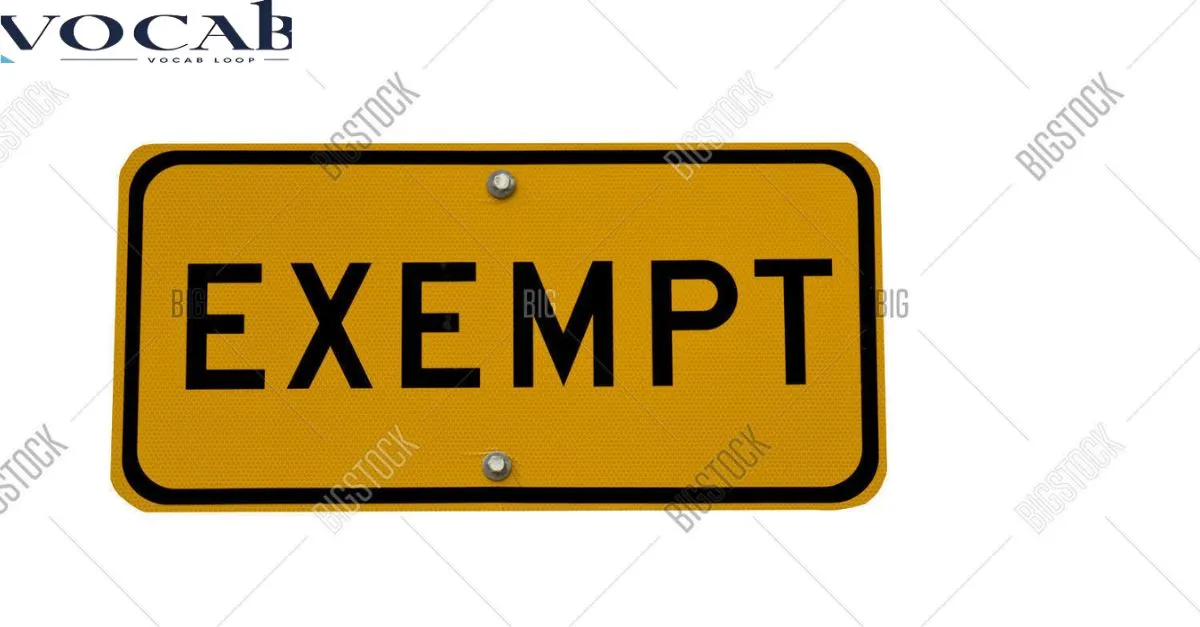
Exception:
- Everyone agreed, with one exception.
- This rule has no exceptions.
- She was an exception to the trend.
- I can make an exception just this once.
- No exceptions are allowed.
- There’s an exception for holidays.
- Exceptions are rare in this case.
- He became the exception, not the rule.
- Every law has exceptions.
- They granted an exception due to the circumstances.
Exemption:
- He filed for a tax exemption.
- Property tax exemptions help veterans.
- The exemption certificate was issued.
- Sales tax exemptions apply to food.
- Charities qualify for exemptions.
- Non-taxable items include books.
- The exemption process is simple.
- Reduced tax rates come with exemptions.
- Exemption management solutions simplify compliance.
- Exemptions vary by state tax rules.
FAQs
Can “exception” and “exemption” be used interchangeably?
No, they serve different purposes.
What are examples of exemptions?
Property taxes and sales tax exemptions.
How do I avoid confusing the two?
Use “exception” for rules and “exemption” for taxes.
Are there exceptions in exemptions?
Yes, exemptions can have conditions.
What is an exemption certificate?
A document granting tax-free status for specific purchases.
Conclusion
The difference between exception and exemption lies in understanding their unique contexts. Exceptions relate to deviations from rules, such as “an exception to the policy,” emphasizing something excluded from a standard. On the other hand, exemptions focus on legal or financial relief, like “sales tax exemptions,” which grant freedom from certain obligations.
Mastering these terms enhances communication and ensures clarity in both formal and casual conversations, helping you accurately convey ideas in contexts ranging from legal documents to everyday speech.

Alex Hormozi is a seasoned blogger at Vocab Loop, known for his deep insights into language, vocabulary, and grammar. With years of experience in writing, Alex shares practical tips and effective strategies to help readers improve their linguistic skills and enhance their writing abilities.

